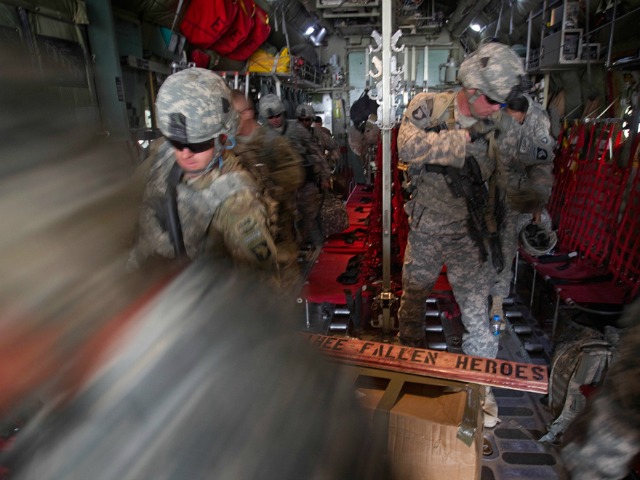Breitbart News Executive Chairman Stephen K. Bannon interviewed author and journalist Toby Harnden to discuss his latest best seller, Dead Men Risen: The Welsh Guards in Afghanistan, on Breitbart News Sunday, Sirius XM radio channel 125.
The prestigious Orwell Prize for Books winner of 2012 tells the incredible tale of a Welsh group of fighters in 2009 caught up in one of the most intense British battles since WW II and their effort to prevent the Taliban from seizing Afghanistan’s Helmand province.
Unfortunately, much like current U.S. soldiers hampered by the “defanging” of the U.S. military by the Obama administration, the British soldiers were victimized by being under-equipped and overstretched while caught in fierce battle. Despite these circumstances, NATO commander General Stanley McChrystal, while waiting for a request for more troops from President Barack Obama, referred to the men as having “burn-in-your-gut passion.”
Harnden, a former British naval officer who comes from a long line of military officers, was at the Welsh Guards’ sides in Helmand in 2009 and conducted nearly three hundred interviews in Afghanistan, England, Wales, and the United States in order to tell the story. Also privy to thousands of documents, he learned, much to his chagrin, that many of the deaths to the soldiers resulted from military and political incompetence.
One of the deaths was of Lieutenant Colonel Rupert Thorneloe, the first British battalion commander killed in action since the 1982 Falklands War. He was blown up by an Improvised Explosive Device (IED) detonated during one of the Guards’ military operations. This incident, Harnden told Bannon, “was the trigger to writing the book. After he died, I thought, ‘I need to get out there and find out what was happening.'”
Bannon, who called the book “such a realistic view of war and combat,” said that it was “shocking… that these guys were so brave, and so tough, had such deep-seated patriotism and yet were sent on an impossible mission, and they weren’t given the material support that you would need to fight.”
Harnden told Bannon that it was the first time since the Korean War that three key levels of leadership had been killed in the same battalion. He explained: “This book is really about what happens when you have under-equipped and under-resourced soldiers in a war, and you don’t give them enough to achieve their mission.”
Perhaps the biggest problems for the Welsh Guard was that the enemy was equipped with low metal or no metal IEDs, and the detection equipment that the Guard had was metal detectors. “So the soldiers had an absolutely terrifying experience walking the roads, knowing that the next step may well be their last,” said Harnden.
The author recounted that the soldiers would be looking for the IEDs and, “every so often they would be walking on one of those roads, there would be an explosion, that would be the end of the soldier and his comrades would be picking the bits out of the trees.”
Also, Harnden explained that the vehicles the soldiers drove in were not well armored. In fact, with Thorneloe’s death, he was driving in a Viking amphibious track vehicle, with no protection on the rear cab. “It was described to me that it was like a baked bean can,” he said. When it ran over the device, it simply shredded,” Harnden recalls. “Huge shards of metal just blew up into the rear cab where Rupert was standing and ripped his legs off and killed the trooper standing next to him instantly.”
“It all is quite shocking,” said Harnden. “I can go on and on with stories, like there are not enough helicopters available” to move in to help wounded soldiers. Delayed response to wounded men on the battlefield contributes to the death of many soldiers in Afghanistan.
Bannon remarked that he is not “a bleeding heart liberal,” but that when reading the book he felt “outrage on every page.” He said that one episode after another pointed out the deficiency of the military to provide for the soldiers who bravely and unselfishly volunteer to serve our country and, in many cases, sacrifice their lives. “If you could see there was some progress being made, you could justify it. But it seems like almost their lives are being thrown away for nothing.”
Harnden laments at the end of his book that, by 2010, the Afghans were no longer aligning themselves with the NATO forces. They knew that the Americans and the British would be leaving, and that there would be dire circumstances if they didn’t stay loyal to the Taliban.
The British Foreign Secretary, David Miliband, asked the Governor of Helmand, Mohammad Mangal, how long he thought the British legacy would last. He was expecting to hear a “decade” or “generation” or some “far reaching time.” But Mangal replied, “Well, for those of us who helped you, within 48 hours we will either be gone or hanging from the nearest tree.”
“Sadly,” says Harnden, “That seems to be the process unfolding at the moment.”

COMMENTS
Please let us know if you're having issues with commenting.